
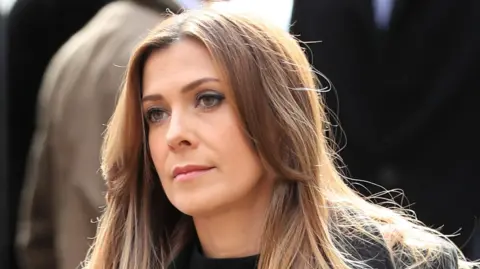 PA Media
PA Media
Actor Kym Marsh spoke to BBC Breakfast about the death of her son Archie
Every year, actress Kym Marsh celebrates the birthday of her son Archie, who died in 2009 after being born just 21 weeks into her pregnancy.
She held her son and organised a funeral for him. Now, her family remembers him at Christmas, and her 13-year-old daughter, born after his death, knows all about him.
But Marsh had no official government certificate of his loss.
Now, she can apply for one as part of an expanded programme for parents in England who lost a baby during pregnancy.
Every year in the UK, an estimated 250,000 pregnancies end through miscarriage before 24 weeks, a loss experienced by about one in five women.
"These certificates mean so much. It makes your baby not just a statistic," Marsh told BBC Breakfast.
"He mattered to all of us, and for us to not get anything that recognised he was here was absolutely heartbreaking, because he was a little person and he was our little person."
"We’re so delighted," she said about the certificates. "This is a huge win for all of us."
The government launched the certificate programme in February for parents who experienced baby loss since September 2018, so the system would not be overwhelmed.
It has now opened up to more parents. Parents can obtain a certificate in memory of their baby if the pregnancy ended before 24 weeks. They can also obtain it for pregnancies that ended before 28 weeks prior to 1 October 1992.
Women and campaigners told the BBC how much the certificates matter to millions of people who have suffered what can often be a hidden loss.
Charley Day received one of the more than 50,000 certificates issued since February after her son Rory died 11 weeks into her pregnancy in July.
She told BBC Breakfast the piece of paper has "changed the whole grieving process".
"For us, that’s just really been incredible - that our baby’s life has recognition," she said.
'The loss is real'
Others applied on Wednesday after waiting for recognition of their losses.
Tracy Fishburn suffered three miscarriages in 2016 and 2017 and said she was “really disappointed” by the initial cut-off date for the certificates. When she heard the restriction was removed, she rushed to apply.
“I was in the middle of the school run. I was crying when I was doing it,” she told the BBC.
All three of her miscarriages happened before 12 weeks.
“I had no scan photos, I hadn’t reached the point of buying them clothes," she said.
She said that had left her feeling "almost like they didn’t exist, apart from in our family".
She said the certificates would bring comfort after the “darkest” period of loss.

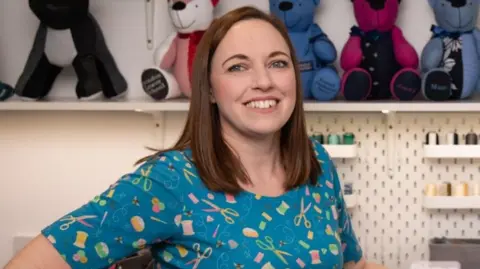 Tigz Rice
Tigz Rice
Tracy Fishburn experienced "missed miscarriages" where the mother does not show any physical signs of loss
Before 08:00 on Wednesday, Kate Jennings had already applied for a certificate to remember her daughter JB, whose heart stopped beating 22 weeks into Kate's pregnancy in 2016.
"Not having that record was really hard and impacted the healing process," she told the BBC.
JB remains a "massive part" of the family, as Kate keeps her daughter's ashes in a ring.
"We literally carry her everywhere," she said.
She said she hoped to see other system reforms in the future as well, such as maternity benefits for pregnancy loss before 24 weeks.

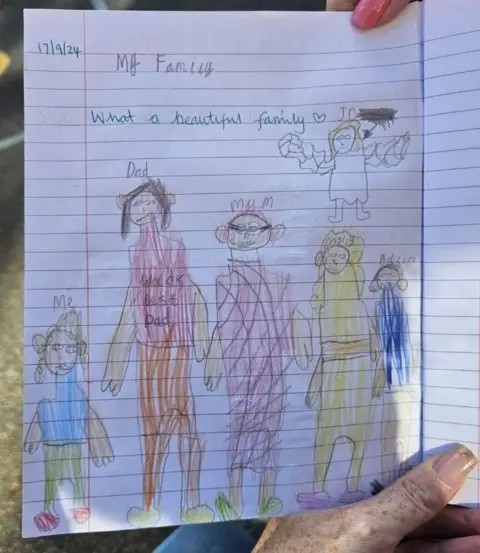 Kate Jennings
Kate Jennings
Jennings' daughter drew a picture of her family including JB
Kirsty Jackson and her husband also immediately requested certificates for the six babies they had lost between 2004 and 2015.
To her, the certificates mean acknowledgment that “you were a mum and dad” and “the loss is real", she told the BBC.
Kirsty wished she had a certificate following her first miscarriage, after she became visibly upset when a pregnant customer came into the bank where she was working.
She said her manager told her to "get a grip, you only had a miscarriage and a D&C" (a procedure to remove tissue from the uterus).
She ended up moving branches and receiving counselling.
“It would have been great to have a certificate to say I lost a baby. No-one believes it’s an actual loss,” Jackson said. "It's still very much a taboo subject."
"People don’t talk about it and share their experiences and what they’ve been through, or they feel like their loss isn’t recognised. Now you’ve got this option to get these certificates.”
Jackson said it was great to see government support and more openness among a younger generation.
She finally had her only son in November 2009 - a “complete miracle”.
'The grief never leaves you'
For other women, Wednesday's news is the result of years of advocacy.
Baroness Benjamin, who introduced a bill to create certificates in the House of Lords, said she would also be applying for the three babies she lost - the first 40 years ago.
"I think about them all the time when it comes to that certain time of year," the former BBC children''s TV presenter told BBC Breakfast.
"The grief never leaves you."
Lady Benjamin said the certificates matter not only to women, but also to men, as she and her husband “used to cry together when I went through a loss”.
The founder of Saying Goodbye Charity, Zoe Clark-Coates, who lost five babies, also said she would be applying after spending nearly 10 years campaigning on behalf of others.
"It’s a really pivotal moment for people, whether they’ve lost their babies yesterday or 80 years ago, who can finally apply for a certificate," she told BBC Radio 4’s Today programme.
"They want something to keep in their family records, for future generations, to be able to see their child was here, even though they didn’t get to stay," she added to BBC Breakfast.
Kym Marsh said official physical documentation is "massively part of the grieving process", making loss more real and helping you to acknowledge and accept.
"Because (Archie) was our child, and he matters just as much as the ones that are lucky enough to be here do," she said.
"A loss is a loss and they were our children."
Additional reporting by Maia Davies

 Movie
Movie 2 months ago
41
2 months ago
41 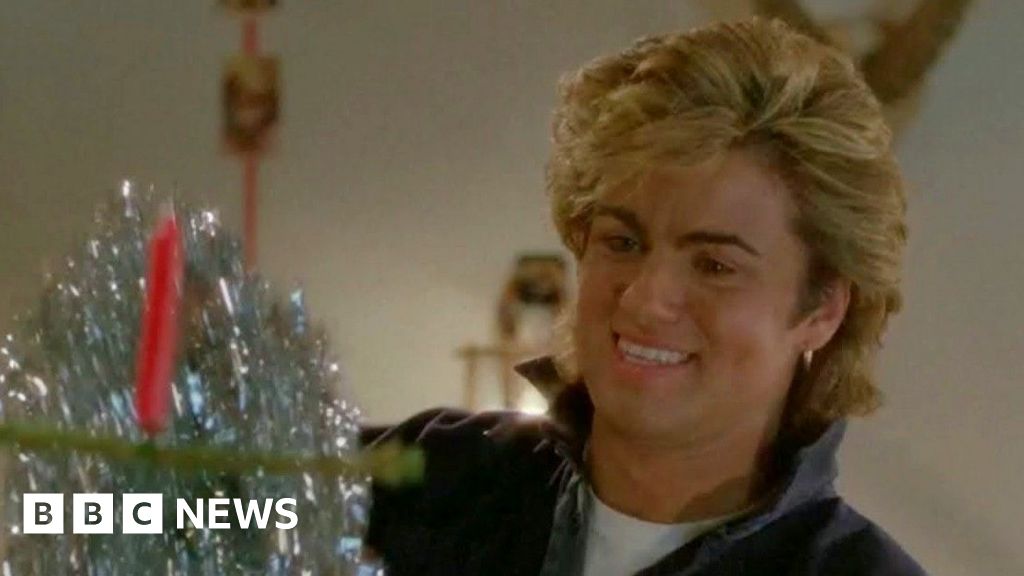

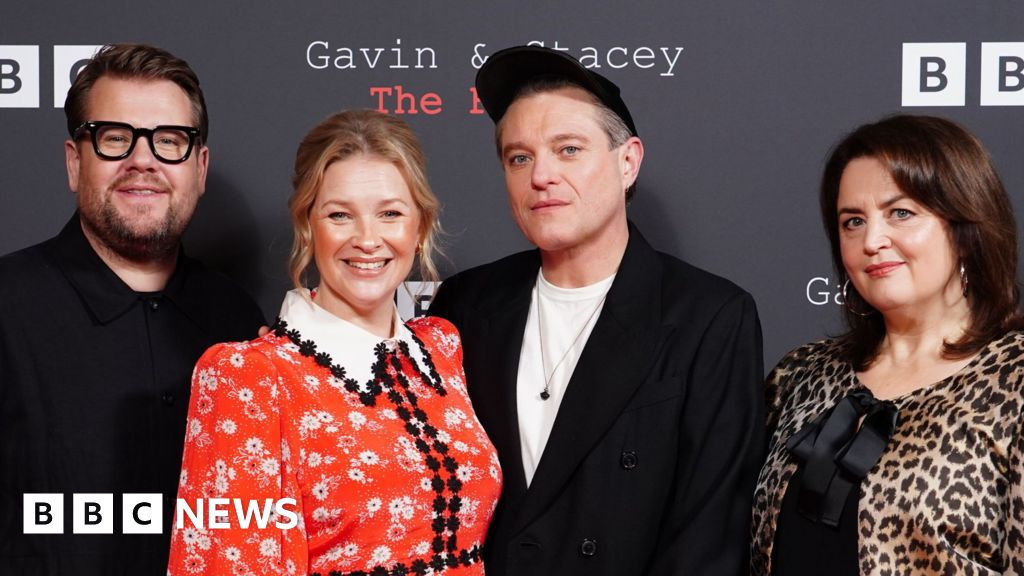
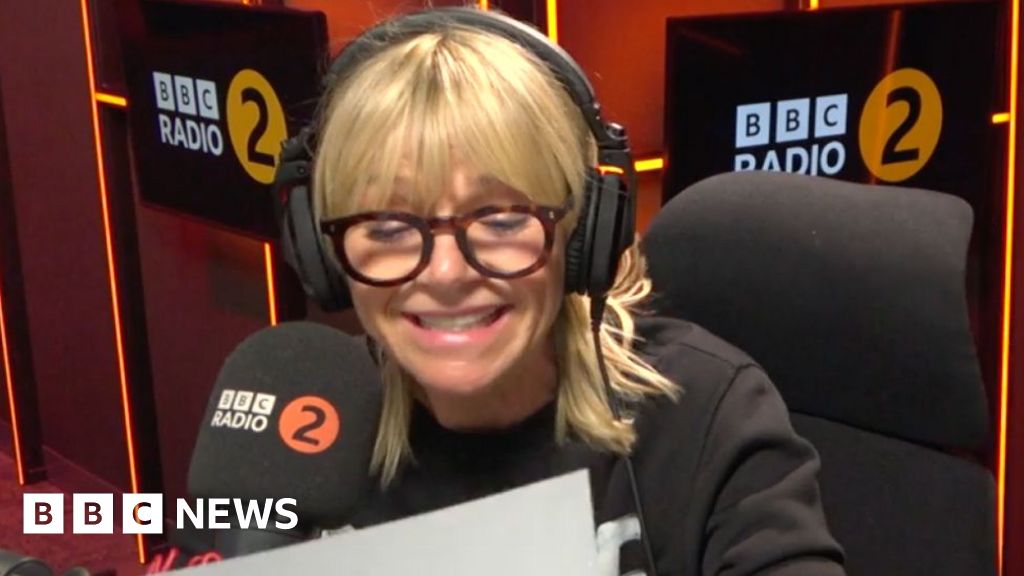

![Presidents Day Weekend Car Sales [2021 Edition] Presidents Day Weekend Car Sales [2021 Edition]](https://www.findthebestcarprice.com/wp-content/uploads/Presidents-Day-Weekend-car-sales.jpg)



 English (United States)
English (United States)